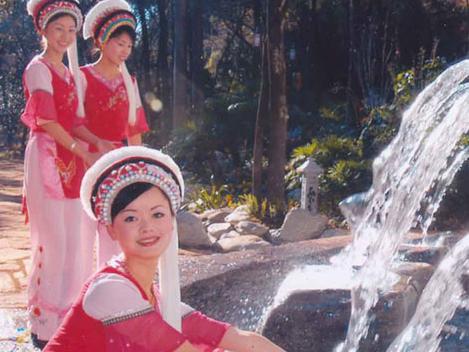
The Nama have been separated from the Bai for about seven centuries. Today they still preserve traditions now lost among many of the Bai. They think that all things have a soul, and they practice a cult of nature similar to what the Bai practiced in the past. The central point in the spiritual life of the Nama is the belief that every phenomenon of nature has its own god. And people are living in midst of them. For the Nama, when a person dies, its body dies, but not its soul, which remains the same as when the person was alive.
One of the most interesting beliefs of the Nama is the cult of the celestial ox. The ox is considered to have the power to prevent disasters, to protect the security of the village, insure peace with their neighbors, and promote the prosperity of their crops and livestock.
They think of the ox as an intermediary between human beings and the gods of the sky. So the Nama perform a ritual sacrifice by means of which they can help the ox to reach the sky to present their petitions to the gods.
This ceremony is central to the spiritual and social life of the Nama. Everyone participates in the festive atmosphere on the day on which the ox is sacrificed for this purpose. The old men remember the old times, the women prepare the food, the young men compete to carry out the sacrifice, while the children observe everything and play around.
During the sacrifice, presided over by a shaman, the whole village is present. It usually takes place during the sixth month of the lunar year, before they begin to work in the fields. A yellow ox is bought that, after the appropriate ceremonies, becomes a celestial ox. For some days it enjoys important privileges, such as moving about freely and eating whatever it wants. If some boy, without understanding its sacred character, hits him, the people of his household will take him before the ox to which he will apologize, offering a gift to the ox.
On the day of the sacrifice, in the morning each family takes wine, rice and vegetables to the square of the celestial ox. The priests hang from its horns a red cloth that is supposed to show the ox the road to heaven, and they take it to the square, where four young men tie its legs. While the shaman burns incense and prays, the youths tie the ox to a branch, killing him with a knife through the neck.
Then the shaman says:
"Don't be afraid, it is not that we want your life, it is that the god of the sky wants you to ascend to the sky and report to him. This is a design of the god that we dare not disobey. Go to the sky. When you arrive, please tell the god good things about us. Help us in our affairs and request the god of the sky to protect our crops, our livestock and the harmony of the village."
Then the ox is skinned. The shaman is rewarded with the skin, the head and the bowels. The rest is distributed among the families. In the same square, people build fires where they will roast their meat and, at this time, even people that don't usually eat ox meat will eat it because it is the meat of the celestial ox.
In the 18th century, with the arrival of the Benzhu religion, both cults melded together. In some villages, when the first temples of the Benzhu cult were built, they had inside them images of the celestial ox. On other occasions, the new cult completely replaced that of the celestial ox. At other times, economic pressures that prohibited the sacrifice of an ox turned the cult of the celestial ox into the cult of the celestial pig. The pig then assumed all the responsibilities of a celestial intermediary, previously assumed by the ox.
The expense was not that large. In the big villages, sacrifices took place once a year; in the smaller, every two or three years.





